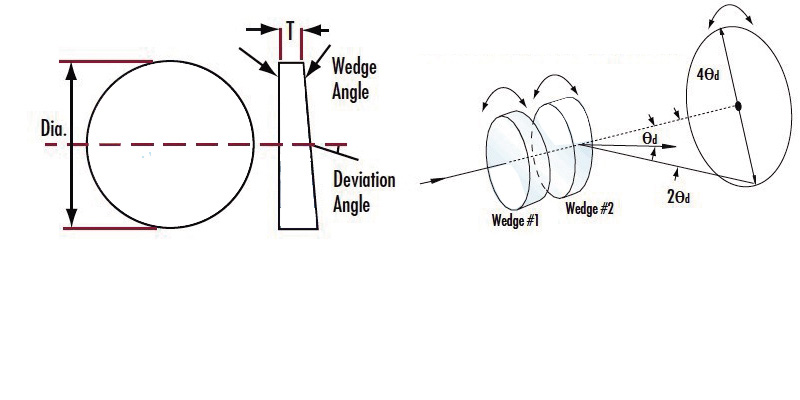The wedge prism can be used to individually deflect a laser beam by a certain angle or combined with another wedge prism for beam deviation purposes. A single prism can shift the incident beam by a specific angle. When two wedge prisms are used together, they can function as deformable prisms to correct the elliptical beam output of a laser tube or to deflect the beam at various angles within a 4θ range, where θ represents the deflection angle of a single prism. This beam shaping is achieved by independently rotating the two wedge prisms, making it ideal for beam scanning at different positions in imaging applications.
The characteristics of wedge prisms include their very small apex angle (typically less than 1/10 radian), which results in minimal deflection of light as it passes through, regardless of the angle of incidence. In optical instruments, two wedge prisms are often combined and rotated relative to each other to produce different deflection angles or to convert the minimum deflection angle of light into the relative rotation angle of the two prisms. This setup is used to compensate for small angular deviations in the measurement of light. Such prisms find applications in many optical instruments, including military rangefinders and camera viewfinders.

Specifications | Commercial spec. | High precision spec. |
Material | UV glass (Quartz, Fused silica) VIS glass (Schott, CDGM, HOYA, etc.) IR material: (Sapphire, ZnSe, Silicon, etc.) Special material: (SiC) | |
Dimension | 5mm~350mm | |
Dimension tolerance | ±0.1mm | ±0.05mm |
Surface quality | 60/40 | 40/20 |
Surface flatness | 1/4λ | 1/10λ |
Clear aperture | >85% of dim | >90% of dim |
Angle tolerance | 3 arc min | 5 arc sec. |
Bevel | <0.2mm x 45deg | <0.1mm x 45deg |
Coating | Up on clients’ request | |
Type No. | Diameter | Angle | Material |
WP-25.4-2.0 | 25.4 | 2.0 | BK7 |
WP-25.4-4.0 | 25.4 | 4.0 | BK7 |
WP-38.1-2.0 | 38.1 | 2.0 | BK7 |
WP-38.1-4.0 | 38.1 | 4.0 | BK7 |
Laser Scanning: Wedge prisms can adjust the direction of the outgoing beam through rotation, making them commonly used in laser scanning devices.
Optical Pointing: In machine vision applications, wedge prisms are used to position the camera’s field of view to the region of interest.
Beam Attenuation: By utilizing double Fresnel reflections, wedge prisms can attenuate high-power lasers while maintaining the beam’s polarization, size, and shape.
Beam Shaping and Translation: Wedge prisms can be used for beam shaping and translation, making them suitable for a variety of optical systems and applications.
